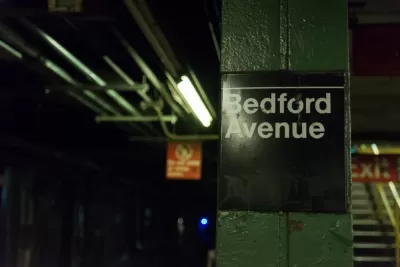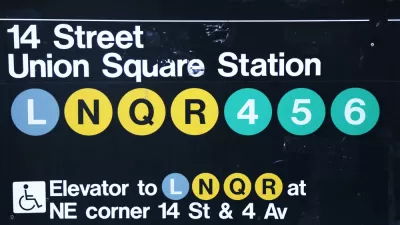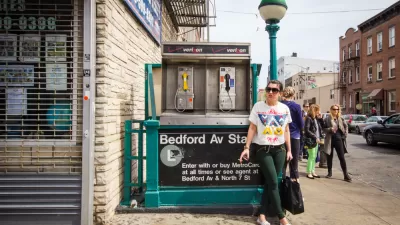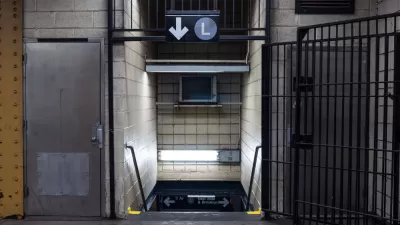The long awaited repair work on the L Train between Brooklyn and Manhattan launched over the weekend.

Ali Watkins and Edgar Sandoval report from the first weekend of a partial shutdown on the L Train on the New York MTA subway system.
"The crowds? Large, but not mutinous. The annoyance levels during the inaugural weekend of the L train slowdown? Present, but predictable."
The MTA is running significantly fewer trains on the L line on nights and weekend for the next 15 to 18 months to make repairs to damage caused by Hurricane Sandy. The partial shutdown is the work of Gov. Andrew Cuomo, who intervened at the 11the hour in a plan to shut down the line completely.
Now the long-awaited repair work has begun, and Watkins and Sandoval report that it all could have gone a lot worse on the first weekend. "Despite doomsday predictions of long turnstile lines, closed station entrances and dangerously crowded platforms, the L train’s first rehab weekend went as well as the Metropolitan Transportation Authority could have hoped."
At the time of their writing, the return to regular schedules for Monday rush hour was an open question, but Stephen Nessen and Jake Offenhartz picked up where Watkins and Sandoval left off.
"On Monday at 5 a.m, L train service was supposed to return to normal after the first weekend of construction, just in time for the morning rush hour. And it did—for an hour. Then at 6 a.m. an L train with mechanical issues caused delays that rippled to Bedford Avenue, where headways jumped from 9 minutes to 24 minutes."
Still, by 6:40 am, the trains were running on schedule again. New York City Transit President Andy Byford was on hand at the Bedford Avenue and was pleased with what he saw, according to the article. Nessen and Offenhartz offer their own assessment of the weekend slowdown too, and paint a slightly less rosy picture.
FULL STORY: L Train Slowdown: First Weekend Disruption Is Frustrating, but Not Disastrous

Planetizen Federal Action Tracker
A weekly monitor of how Trump’s orders and actions are impacting planners and planning in America.

Chicago’s Ghost Rails
Just beneath the surface of the modern city lie the remnants of its expansive early 20th-century streetcar system.

San Antonio and Austin are Fusing Into one Massive Megaregion
The region spanning the two central Texas cities is growing fast, posing challenges for local infrastructure and water supplies.

Since Zion's Shuttles Went Electric “The Smog is Gone”
Visitors to Zion National Park can enjoy the canyon via the nation’s first fully electric park shuttle system.

Trump Distributing DOT Safety Funds at 1/10 Rate of Biden
Funds for Safe Streets and other transportation safety and equity programs are being held up by administrative reviews and conflicts with the Trump administration’s priorities.

German Cities Subsidize Taxis for Women Amid Wave of Violence
Free or low-cost taxi rides can help women navigate cities more safely, but critics say the programs don't address the root causes of violence against women.
Urban Design for Planners 1: Software Tools
This six-course series explores essential urban design concepts using open source software and equips planners with the tools they need to participate fully in the urban design process.
Planning for Universal Design
Learn the tools for implementing Universal Design in planning regulations.
planning NEXT
Appalachian Highlands Housing Partners
Mpact (founded as Rail~Volution)
City of Camden Redevelopment Agency
City of Astoria
City of Portland
City of Laramie





























